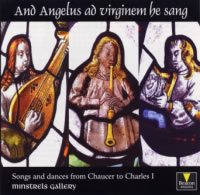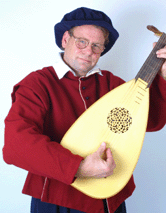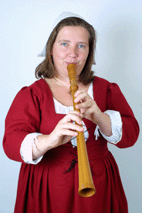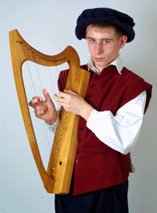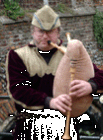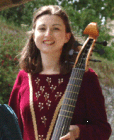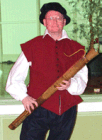And Angelus ad virginem he sang by Minstrels Gallery
Music and song from all over Europe is presented on this CD, demonstrating the huge diversity of music heard from royal court to peasant wedding. Pieces from as early as the 13th century up to the middle of the 17th are played on a wide selection of period instruments Buy this album now CD: £9.99 + p&p |
| 1 | Basse Dance Die Burste | Attaingnant
1530 |
| 2 | Saltarello | Anon
Italy 14C |
| 3 | Angelus Ad Virginem | Trad
England 13C |
| 4 | Basse Dance & Die Katze | Attaingnant
1530 |
| 5 | Branle De Bourgogne | Le
Roy 1520-1598 |
| 6 | Miri It Is | Anon
England 13C |
| 7 | Basse Dance Magdalena | Attaingnant
1530 |
| 8 | Questa Fanciull' Amor | Landini
1325-1397 |
| 9 | Tomorrow The Fox | Ravenscroft
1582-1635 |
| 10 | Estampie | Anon
England 13C |
| 11 | Dove Son Quel Fieri Occhi? | Anon
Italy 16C |
| 12 | Sumer Is Icumen In | Anon
England 13C |
| 13 | Greenwood
Tree & Sellengers Round |
Playford
1651-1728 |
| 14 | Ronde Wo Bistu | Tielman
Susato 1551 |
| 15 | A La Fontanella | Anon
Trouvere France 13C |
| 16 | Ronde Warum | Tielman
Susato 1551 |
| 17 | Trotto | Anon
Italy 14C |
| 18 | Of All The Birds | Ravenscroft
1582-1635 |
| 19 | Galliarde d'Ecosse | Phalese
1583 |
| 20 | Vertias Arpie | Anon
France 1316 |
| 21 | Belle Qui | Arbeau
1589 |
| 22 | Glory Of The West | Playford
1651-1728 |
| 23 | La Bergamesca | Anon
Italy 16C |
| 24 | Blow Thy Horne | Cornysh
1468-1523 |
| 25 | Calino Casturame | Byrd
1543-1623 |
| 26 | Branle De L'Official | Arbeau
1589 |
| 27 | Pasa El Agoa Ma Julieta | Anon
Spain 16C |
| 28 | Sussex Carol | Trad
England |
| 29 | Galliarde De La Bataille | Phalese
1583 |
| 30 | Byrd One Brere | Anon
England 14C |
| 31 | Douce Dame Jolie | Machaut
1300-1377 |
| 32 | Putta Nera Ballo Furlano | Phalese
1583 |
| 33 | Ductia | Anon
England 13C |
Sleeve
Notes Towards the end of the fourteenth century Geoffrey Chaucer wrote in The Millers Tale: "And over all there lay a psaltery, Whereon he made an evening’s melody, Playing so sweetly that the chamber rang, And Angelus ad virginem he sang" This CD brings together a collection of pieces that represent some of the best music from the comparatively long period that runs in England from the time of Geoffrey Chaucer to that of Charles I. During that time both secular and religious music changed and developed quite considerably. Plain song gave way to polyphony and part singing, instruments became more sophisticated and individual composers began to make a living working for their aristocratic employers and religious establishments. In France the troubadours of Provence sparked off a huge poetic and musical movement that spread across the whole of western Europe. These were essentially aristocrats and noble men that embraced the art of courtly love and expressed it in songs and ballads. They were what we now think of as wandering minstrels’ and practiced their art during the early middle ages. Popular accompanying instruments at this time would have been the lap harp or the psaltery, a wire strung instrument plucked with a quill. As the middle ages gave way to the Renaissance, Henry VIII became king of England, marking a massive shift in the politics of the country. Henry himself was a keen player of the recorder, lute and viol, as well as being a composer in his own right. By the time Henrys daughter, Elizabeth, came to the throne music had reached a golden age in England. Composers such as Thomas Tallis and William Byrd were writing sublime church music, whilst John Dowland was pouring out secular lute songs and madrigals of the highest quality. Music also played an important part in the newly flowering theatre scene in London. Shakespeare makes countless references to music in his plays, indeed it is the second word uttered in Twelfth Night: “If music be the food of love play on”. And play on it did through the reign of Elizabeth I, with much music written to celebrate the life and finally the death of the virgin queen. The execution of Charles I along with the great fire of London wrought permanent change in the land, most of medieval London disappeared and music too was to change radically. With the rise of the orchestra, the development of opera and the beginning of the Baroque, the court Minstrels in their Gallery had seen their final days. Minstrels Gallery were formed in 1997 by Tony Scheuregger to provide early music at weddings, dinners, parties and concerts. The group has developed an eclectic repertoire of music from the early medieval period through to the middle 17th century. The ensemble have played throughout the United Kingdom performing at venues including The British Museum, The Reform Club, The National Maritime Museum, Banqueting House, Leeds Castle and many other places of special Historic Interest. The group have played live sets on BBC local radio, provided music for a London Theatre and perform regularly at concerts and festivals. This, the second CD from Minstrels Gallery, explores the range and diversity of music from the pre baroque age. |
Credits TONY
SCHEUREGGER: crumhorn. flute, fiddle, guitar, mandolin,
mandora, percussion, recorder, vihuela, voice. Also appearing Julie Black: recorder, voice. Louise Black: voice. Laura Cannell: recorder: Steve Hornung: bagpipes. Tessa Shepherd: curtal. This CD was recorded in 2003 on a Yamaha 16 track digital recorder with a combination of microphones by AKG and Rode. Beacon specialise in the recording of acoustic music and may be contacted by email info@beaconprod.freeserve.co.uk Front
cover photograph 3 stained glasses from Rainthorpe Hall, Norfolk |
| Instruments: | Medieval Instruments |
| Genre: | Medieval Music |
| Format: | CD Rom |
| Our Ref: | A0043 |
| MCPS: | MG003 |
| Label: | BEACON |
| Year: | 2003 |
| Origin: | UK |
Minstrels Gallery are a group specialising in music from medieval, through the Elizabethan period to the time of Oliver Cromwell. Between us we play over 40 different, accurately reconstructed instruments of the period. We also sing, recite verse and perform various other entertainments in keeping with past times. Minstrels Gallery; Martin, Tony and Jane, usually work as a trio but may be booked as a duo and for larger functions the group may be augmented up to seven players. We also work with a number of very good entertainers, juggler, stilt walker, fire eater, jester, and can also recommend falconers, jousters, knights on horseback, fight re-enactment groups, archers, hog roast and more.
Minstrels Gallery came about as a result of Tony's earlier experiences playing at medieval banquets in the Suffolk town of Bungay. Way back in late 1975 Tony was part of a group called 'Quodling's Delight' playing mainly at medieval banquets and the occasional concert. After
a gap of many years Tony formed a new group with his wife Jane
calling itself Minstrels Gallery. The membership of the group
has varied over the years but has now settled to a core of Tony,
Jane and son Martin. Other players join the group from time to
time either to meet the requirements of two engagements on the
same day or where a larger ensemble is needed.
|
||||||||||||||||||||||||||||
Contact
Details |
Tony
Scheuregger Minstrels Gallery 43 Muriel Road Norwich, Norfolk England NR2 3NY |
|||||||||||||||||||||||||||
Telephone |
01603 454402 | |||||||||||||||||||||||||||
Mobile |
07798 521577 | |||||||||||||||||||||||||||
E-mail |
info@minstrelsgallery.com | |||||||||||||||||||||||||||
Artists
Web Site |
www.minstrelsgallery.com | |||||||||||||||||||||||||||
